Shopify Case Study: E-commerce Platform, Strategies, and Leadership
VerifiedAdded on 2023/01/13
|8
|3884
|62
Case Study
AI Summary
This case study delves into Shopify's journey from its inception as a snowboarding tool to its current status as a leading e-commerce platform. It examines the leadership of Tobi Lutke, highlighting his vision, problem-solving approach, and customer-centric culture. The study analyzes Shopify's business model, growth strategies, and innovative use of technology, including its API and App Store, which fueled its expansion and global reach. The case explores Shopify's core principles, such as planning for the future and finding simple solutions, and how these have contributed to its success in dislodging older platforms. The study also addresses Shopify's strategies for acquiring new customers, increasing revenue, and adapting to challenges like the COVID-19 pandemic. Furthermore, it examines the company's brand value, market impact, and its commitment to supporting merchants through various initiatives. The case study also touches upon leadership style and the importance of adaptability and continuous learning within the organization. This case study provides a comprehensive understanding of Shopify's journey, its strategies, and its impact on the e-commerce landscape.
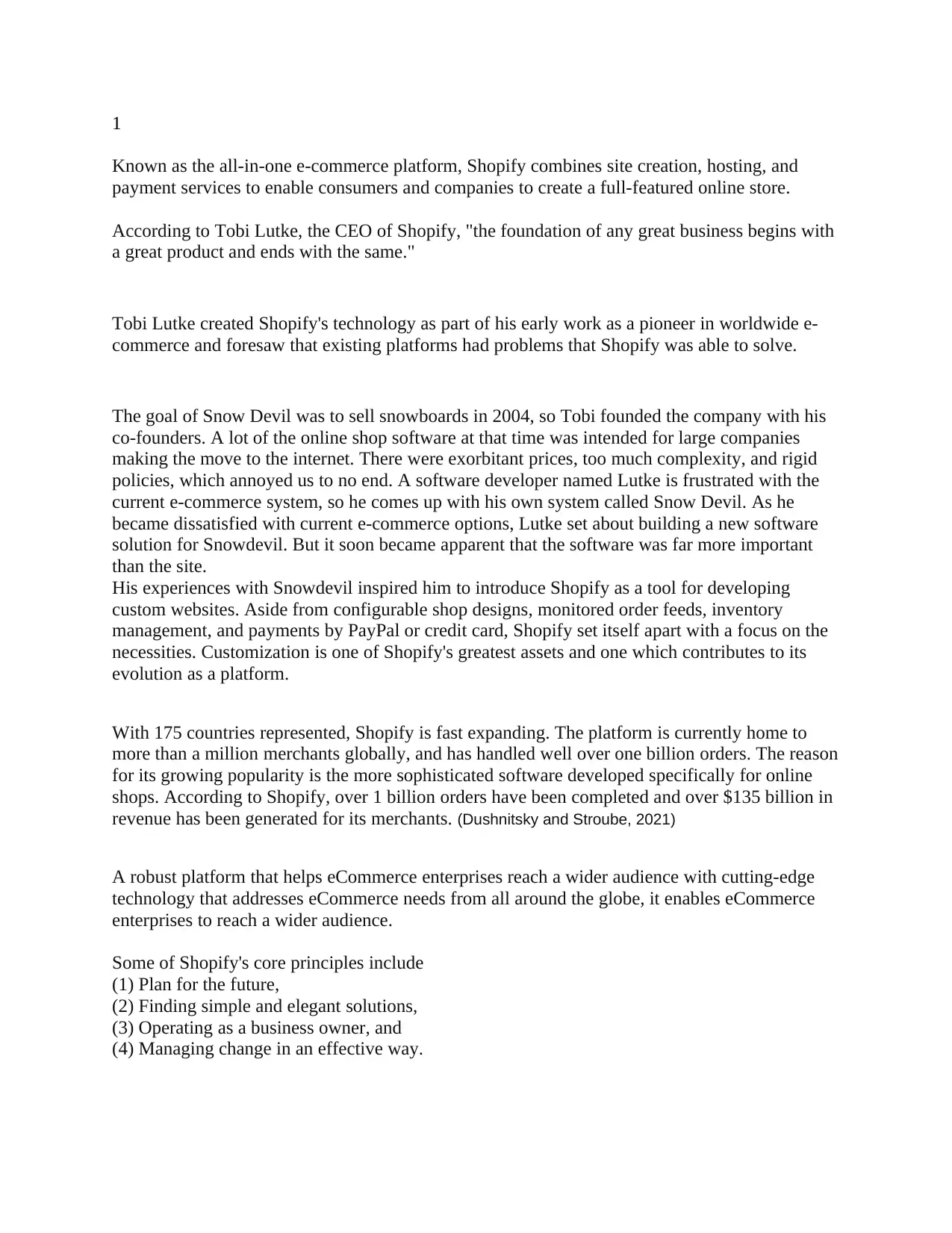
1
Known as the all-in-one e-commerce platform, Shopify combines site creation, hosting, and
payment services to enable consumers and companies to create a full-featured online store.
According to Tobi Lutke, the CEO of Shopify, "the foundation of any great business begins with
a great product and ends with the same."
Tobi Lutke created Shopify's technology as part of his early work as a pioneer in worldwide e-
commerce and foresaw that existing platforms had problems that Shopify was able to solve.
The goal of Snow Devil was to sell snowboards in 2004, so Tobi founded the company with his
co-founders. A lot of the online shop software at that time was intended for large companies
making the move to the internet. There were exorbitant prices, too much complexity, and rigid
policies, which annoyed us to no end. A software developer named Lutke is frustrated with the
current e-commerce system, so he comes up with his own system called Snow Devil. As he
became dissatisfied with current e-commerce options, Lutke set about building a new software
solution for Snowdevil. But it soon became apparent that the software was far more important
than the site.
His experiences with Snowdevil inspired him to introduce Shopify as a tool for developing
custom websites. Aside from configurable shop designs, monitored order feeds, inventory
management, and payments by PayPal or credit card, Shopify set itself apart with a focus on the
necessities. Customization is one of Shopify's greatest assets and one which contributes to its
evolution as a platform.
With 175 countries represented, Shopify is fast expanding. The platform is currently home to
more than a million merchants globally, and has handled well over one billion orders. The reason
for its growing popularity is the more sophisticated software developed specifically for online
shops. According to Shopify, over 1 billion orders have been completed and over $135 billion in
revenue has been generated for its merchants. (Dushnitsky and Stroube, 2021)
A robust platform that helps eCommerce enterprises reach a wider audience with cutting-edge
technology that addresses eCommerce needs from all around the globe, it enables eCommerce
enterprises to reach a wider audience.
Some of Shopify's core principles include
(1) Plan for the future,
(2) Finding simple and elegant solutions,
(3) Operating as a business owner, and
(4) Managing change in an effective way.
Known as the all-in-one e-commerce platform, Shopify combines site creation, hosting, and
payment services to enable consumers and companies to create a full-featured online store.
According to Tobi Lutke, the CEO of Shopify, "the foundation of any great business begins with
a great product and ends with the same."
Tobi Lutke created Shopify's technology as part of his early work as a pioneer in worldwide e-
commerce and foresaw that existing platforms had problems that Shopify was able to solve.
The goal of Snow Devil was to sell snowboards in 2004, so Tobi founded the company with his
co-founders. A lot of the online shop software at that time was intended for large companies
making the move to the internet. There were exorbitant prices, too much complexity, and rigid
policies, which annoyed us to no end. A software developer named Lutke is frustrated with the
current e-commerce system, so he comes up with his own system called Snow Devil. As he
became dissatisfied with current e-commerce options, Lutke set about building a new software
solution for Snowdevil. But it soon became apparent that the software was far more important
than the site.
His experiences with Snowdevil inspired him to introduce Shopify as a tool for developing
custom websites. Aside from configurable shop designs, monitored order feeds, inventory
management, and payments by PayPal or credit card, Shopify set itself apart with a focus on the
necessities. Customization is one of Shopify's greatest assets and one which contributes to its
evolution as a platform.
With 175 countries represented, Shopify is fast expanding. The platform is currently home to
more than a million merchants globally, and has handled well over one billion orders. The reason
for its growing popularity is the more sophisticated software developed specifically for online
shops. According to Shopify, over 1 billion orders have been completed and over $135 billion in
revenue has been generated for its merchants. (Dushnitsky and Stroube, 2021)
A robust platform that helps eCommerce enterprises reach a wider audience with cutting-edge
technology that addresses eCommerce needs from all around the globe, it enables eCommerce
enterprises to reach a wider audience.
Some of Shopify's core principles include
(1) Plan for the future,
(2) Finding simple and elegant solutions,
(3) Operating as a business owner, and
(4) Managing change in an effective way.
Paraphrase This Document
Need a fresh take? Get an instant paraphrase of this document with our AI Paraphraser
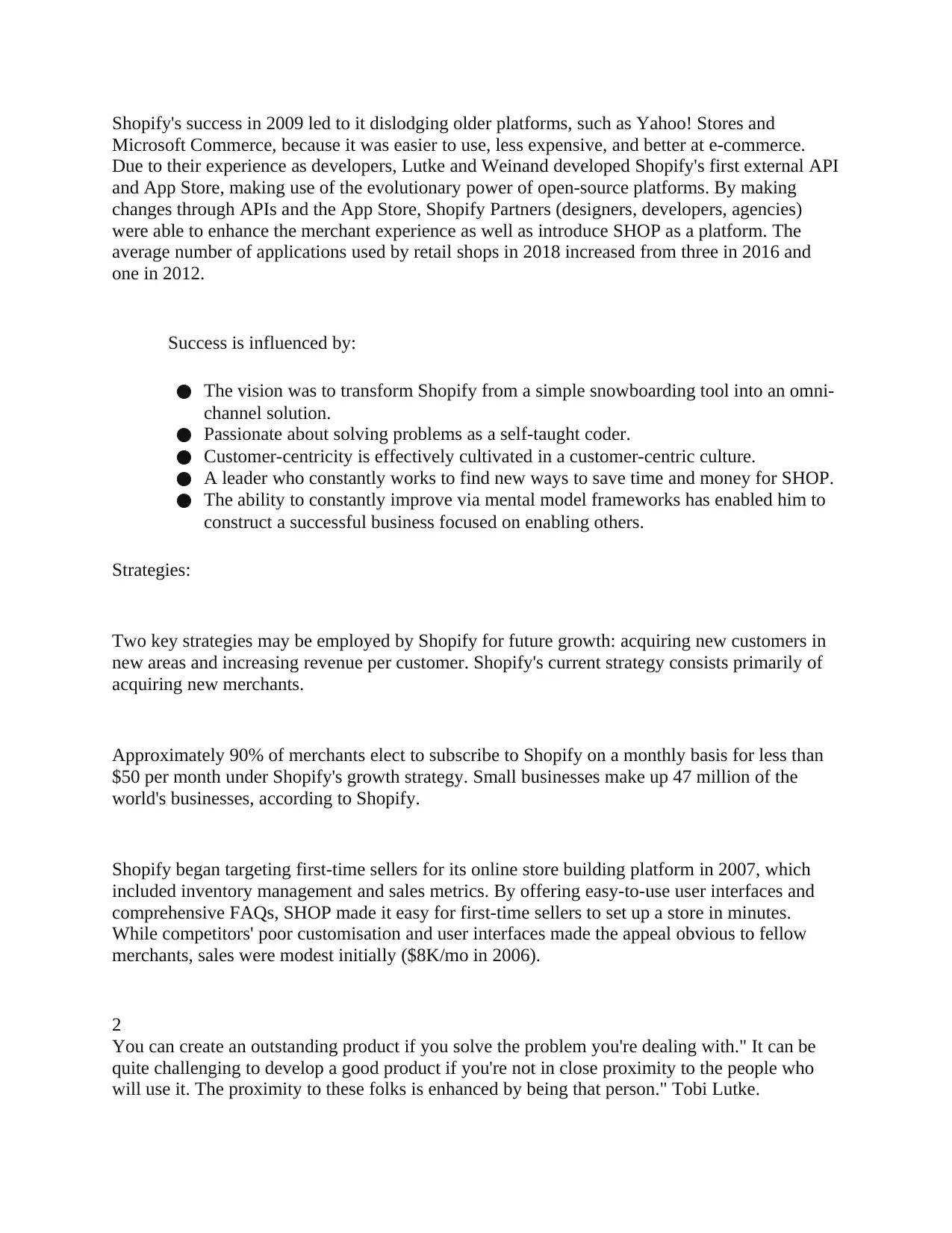
Shopify's success in 2009 led to it dislodging older platforms, such as Yahoo! Stores and
Microsoft Commerce, because it was easier to use, less expensive, and better at e-commerce.
Due to their experience as developers, Lutke and Weinand developed Shopify's first external API
and App Store, making use of the evolutionary power of open-source platforms. By making
changes through APIs and the App Store, Shopify Partners (designers, developers, agencies)
were able to enhance the merchant experience as well as introduce SHOP as a platform. The
average number of applications used by retail shops in 2018 increased from three in 2016 and
one in 2012.
Success is influenced by:
● The vision was to transform Shopify from a simple snowboarding tool into an omni-
channel solution.
● Passionate about solving problems as a self-taught coder.
● Customer-centricity is effectively cultivated in a customer-centric culture.
● A leader who constantly works to find new ways to save time and money for SHOP.
● The ability to constantly improve via mental model frameworks has enabled him to
construct a successful business focused on enabling others.
Strategies:
Two key strategies may be employed by Shopify for future growth: acquiring new customers in
new areas and increasing revenue per customer. Shopify's current strategy consists primarily of
acquiring new merchants.
Approximately 90% of merchants elect to subscribe to Shopify on a monthly basis for less than
$50 per month under Shopify's growth strategy. Small businesses make up 47 million of the
world's businesses, according to Shopify.
Shopify began targeting first-time sellers for its online store building platform in 2007, which
included inventory management and sales metrics. By offering easy-to-use user interfaces and
comprehensive FAQs, SHOP made it easy for first-time sellers to set up a store in minutes.
While competitors' poor customisation and user interfaces made the appeal obvious to fellow
merchants, sales were modest initially ($8K/mo in 2006).
2
You can create an outstanding product if you solve the problem you're dealing with." It can be
quite challenging to develop a good product if you're not in close proximity to the people who
will use it. The proximity to these folks is enhanced by being that person." Tobi Lutke.
Microsoft Commerce, because it was easier to use, less expensive, and better at e-commerce.
Due to their experience as developers, Lutke and Weinand developed Shopify's first external API
and App Store, making use of the evolutionary power of open-source platforms. By making
changes through APIs and the App Store, Shopify Partners (designers, developers, agencies)
were able to enhance the merchant experience as well as introduce SHOP as a platform. The
average number of applications used by retail shops in 2018 increased from three in 2016 and
one in 2012.
Success is influenced by:
● The vision was to transform Shopify from a simple snowboarding tool into an omni-
channel solution.
● Passionate about solving problems as a self-taught coder.
● Customer-centricity is effectively cultivated in a customer-centric culture.
● A leader who constantly works to find new ways to save time and money for SHOP.
● The ability to constantly improve via mental model frameworks has enabled him to
construct a successful business focused on enabling others.
Strategies:
Two key strategies may be employed by Shopify for future growth: acquiring new customers in
new areas and increasing revenue per customer. Shopify's current strategy consists primarily of
acquiring new merchants.
Approximately 90% of merchants elect to subscribe to Shopify on a monthly basis for less than
$50 per month under Shopify's growth strategy. Small businesses make up 47 million of the
world's businesses, according to Shopify.
Shopify began targeting first-time sellers for its online store building platform in 2007, which
included inventory management and sales metrics. By offering easy-to-use user interfaces and
comprehensive FAQs, SHOP made it easy for first-time sellers to set up a store in minutes.
While competitors' poor customisation and user interfaces made the appeal obvious to fellow
merchants, sales were modest initially ($8K/mo in 2006).
2
You can create an outstanding product if you solve the problem you're dealing with." It can be
quite challenging to develop a good product if you're not in close proximity to the people who
will use it. The proximity to these folks is enhanced by being that person." Tobi Lutke.
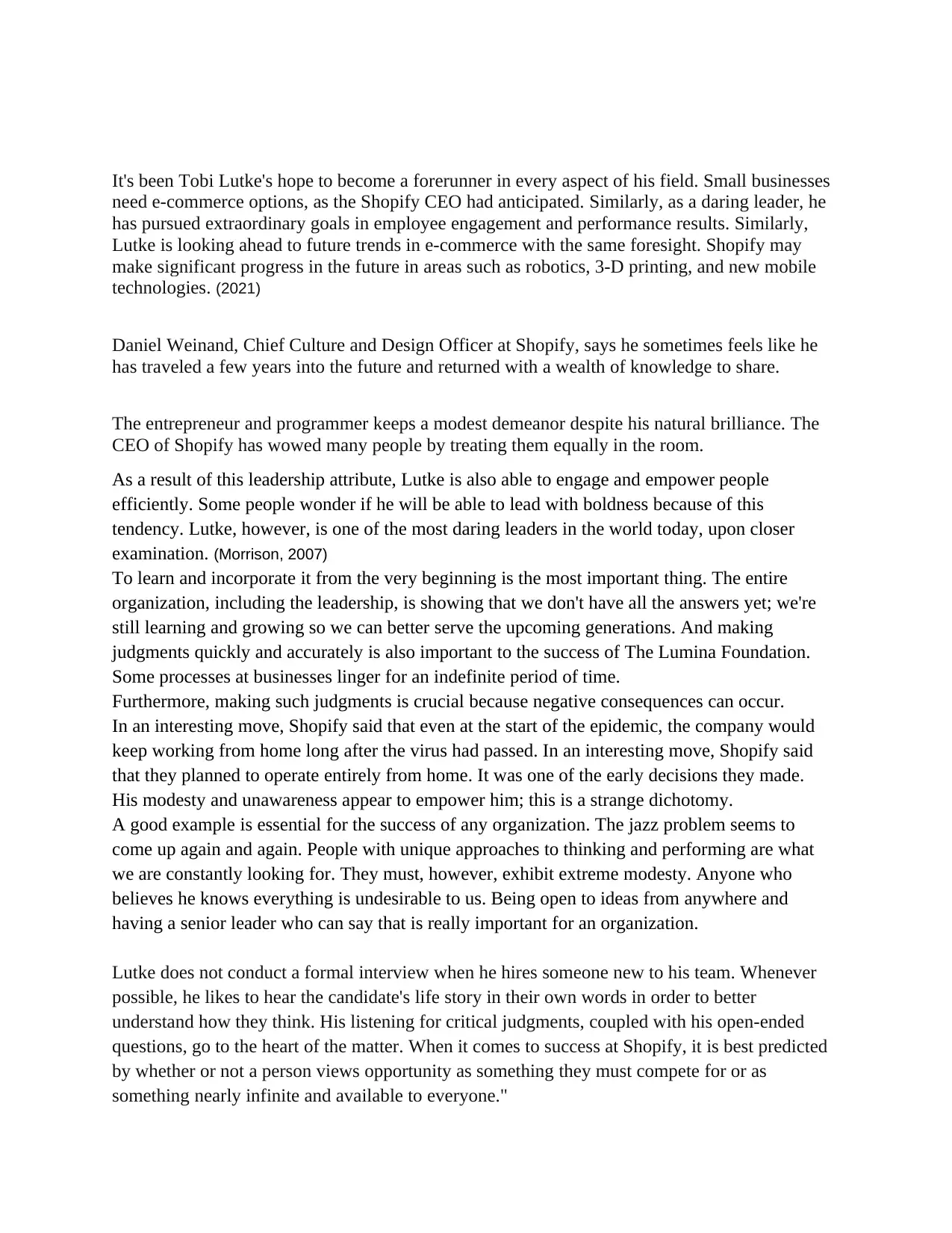
It's been Tobi Lutke's hope to become a forerunner in every aspect of his field. Small businesses
need e-commerce options, as the Shopify CEO had anticipated. Similarly, as a daring leader, he
has pursued extraordinary goals in employee engagement and performance results. Similarly,
Lutke is looking ahead to future trends in e-commerce with the same foresight. Shopify may
make significant progress in the future in areas such as robotics, 3-D printing, and new mobile
technologies. (2021)
Daniel Weinand, Chief Culture and Design Officer at Shopify, says he sometimes feels like he
has traveled a few years into the future and returned with a wealth of knowledge to share.
The entrepreneur and programmer keeps a modest demeanor despite his natural brilliance. The
CEO of Shopify has wowed many people by treating them equally in the room.
As a result of this leadership attribute, Lutke is also able to engage and empower people
efficiently. Some people wonder if he will be able to lead with boldness because of this
tendency. Lutke, however, is one of the most daring leaders in the world today, upon closer
examination. (Morrison, 2007)
To learn and incorporate it from the very beginning is the most important thing. The entire
organization, including the leadership, is showing that we don't have all the answers yet; we're
still learning and growing so we can better serve the upcoming generations. And making
judgments quickly and accurately is also important to the success of The Lumina Foundation.
Some processes at businesses linger for an indefinite period of time.
Furthermore, making such judgments is crucial because negative consequences can occur.
In an interesting move, Shopify said that even at the start of the epidemic, the company would
keep working from home long after the virus had passed. In an interesting move, Shopify said
that they planned to operate entirely from home. It was one of the early decisions they made.
His modesty and unawareness appear to empower him; this is a strange dichotomy.
A good example is essential for the success of any organization. The jazz problem seems to
come up again and again. People with unique approaches to thinking and performing are what
we are constantly looking for. They must, however, exhibit extreme modesty. Anyone who
believes he knows everything is undesirable to us. Being open to ideas from anywhere and
having a senior leader who can say that is really important for an organization.
Lutke does not conduct a formal interview when he hires someone new to his team. Whenever
possible, he likes to hear the candidate's life story in their own words in order to better
understand how they think. His listening for critical judgments, coupled with his open-ended
questions, go to the heart of the matter. When it comes to success at Shopify, it is best predicted
by whether or not a person views opportunity as something they must compete for or as
something nearly infinite and available to everyone."
need e-commerce options, as the Shopify CEO had anticipated. Similarly, as a daring leader, he
has pursued extraordinary goals in employee engagement and performance results. Similarly,
Lutke is looking ahead to future trends in e-commerce with the same foresight. Shopify may
make significant progress in the future in areas such as robotics, 3-D printing, and new mobile
technologies. (2021)
Daniel Weinand, Chief Culture and Design Officer at Shopify, says he sometimes feels like he
has traveled a few years into the future and returned with a wealth of knowledge to share.
The entrepreneur and programmer keeps a modest demeanor despite his natural brilliance. The
CEO of Shopify has wowed many people by treating them equally in the room.
As a result of this leadership attribute, Lutke is also able to engage and empower people
efficiently. Some people wonder if he will be able to lead with boldness because of this
tendency. Lutke, however, is one of the most daring leaders in the world today, upon closer
examination. (Morrison, 2007)
To learn and incorporate it from the very beginning is the most important thing. The entire
organization, including the leadership, is showing that we don't have all the answers yet; we're
still learning and growing so we can better serve the upcoming generations. And making
judgments quickly and accurately is also important to the success of The Lumina Foundation.
Some processes at businesses linger for an indefinite period of time.
Furthermore, making such judgments is crucial because negative consequences can occur.
In an interesting move, Shopify said that even at the start of the epidemic, the company would
keep working from home long after the virus had passed. In an interesting move, Shopify said
that they planned to operate entirely from home. It was one of the early decisions they made.
His modesty and unawareness appear to empower him; this is a strange dichotomy.
A good example is essential for the success of any organization. The jazz problem seems to
come up again and again. People with unique approaches to thinking and performing are what
we are constantly looking for. They must, however, exhibit extreme modesty. Anyone who
believes he knows everything is undesirable to us. Being open to ideas from anywhere and
having a senior leader who can say that is really important for an organization.
Lutke does not conduct a formal interview when he hires someone new to his team. Whenever
possible, he likes to hear the candidate's life story in their own words in order to better
understand how they think. His listening for critical judgments, coupled with his open-ended
questions, go to the heart of the matter. When it comes to success at Shopify, it is best predicted
by whether or not a person views opportunity as something they must compete for or as
something nearly infinite and available to everyone."
⊘ This is a preview!⊘
Do you want full access?
Subscribe today to unlock all pages.

Trusted by 1+ million students worldwide
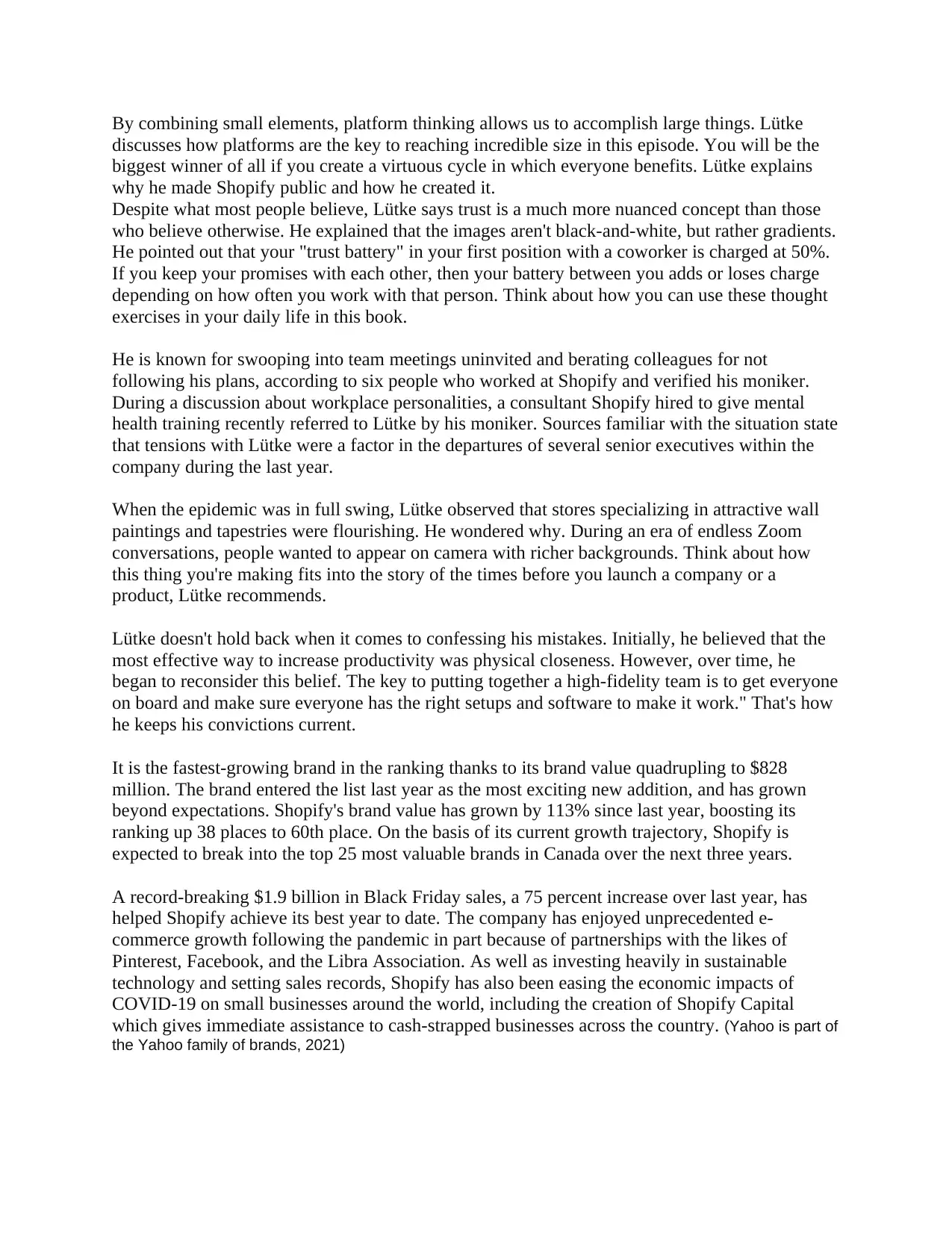
By combining small elements, platform thinking allows us to accomplish large things. Lütke
discusses how platforms are the key to reaching incredible size in this episode. You will be the
biggest winner of all if you create a virtuous cycle in which everyone benefits. Lütke explains
why he made Shopify public and how he created it.
Despite what most people believe, Lütke says trust is a much more nuanced concept than those
who believe otherwise. He explained that the images aren't black-and-white, but rather gradients.
He pointed out that your "trust battery" in your first position with a coworker is charged at 50%.
If you keep your promises with each other, then your battery between you adds or loses charge
depending on how often you work with that person. Think about how you can use these thought
exercises in your daily life in this book.
He is known for swooping into team meetings uninvited and berating colleagues for not
following his plans, according to six people who worked at Shopify and verified his moniker.
During a discussion about workplace personalities, a consultant Shopify hired to give mental
health training recently referred to Lütke by his moniker. Sources familiar with the situation state
that tensions with Lütke were a factor in the departures of several senior executives within the
company during the last year.
When the epidemic was in full swing, Lütke observed that stores specializing in attractive wall
paintings and tapestries were flourishing. He wondered why. During an era of endless Zoom
conversations, people wanted to appear on camera with richer backgrounds. Think about how
this thing you're making fits into the story of the times before you launch a company or a
product, Lütke recommends.
Lütke doesn't hold back when it comes to confessing his mistakes. Initially, he believed that the
most effective way to increase productivity was physical closeness. However, over time, he
began to reconsider this belief. The key to putting together a high-fidelity team is to get everyone
on board and make sure everyone has the right setups and software to make it work." That's how
he keeps his convictions current.
It is the fastest-growing brand in the ranking thanks to its brand value quadrupling to $828
million. The brand entered the list last year as the most exciting new addition, and has grown
beyond expectations. Shopify's brand value has grown by 113% since last year, boosting its
ranking up 38 places to 60th place. On the basis of its current growth trajectory, Shopify is
expected to break into the top 25 most valuable brands in Canada over the next three years.
A record-breaking $1.9 billion in Black Friday sales, a 75 percent increase over last year, has
helped Shopify achieve its best year to date. The company has enjoyed unprecedented e-
commerce growth following the pandemic in part because of partnerships with the likes of
Pinterest, Facebook, and the Libra Association. As well as investing heavily in sustainable
technology and setting sales records, Shopify has also been easing the economic impacts of
COVID-19 on small businesses around the world, including the creation of Shopify Capital
which gives immediate assistance to cash-strapped businesses across the country. (Yahoo is part of
the Yahoo family of brands, 2021)
discusses how platforms are the key to reaching incredible size in this episode. You will be the
biggest winner of all if you create a virtuous cycle in which everyone benefits. Lütke explains
why he made Shopify public and how he created it.
Despite what most people believe, Lütke says trust is a much more nuanced concept than those
who believe otherwise. He explained that the images aren't black-and-white, but rather gradients.
He pointed out that your "trust battery" in your first position with a coworker is charged at 50%.
If you keep your promises with each other, then your battery between you adds or loses charge
depending on how often you work with that person. Think about how you can use these thought
exercises in your daily life in this book.
He is known for swooping into team meetings uninvited and berating colleagues for not
following his plans, according to six people who worked at Shopify and verified his moniker.
During a discussion about workplace personalities, a consultant Shopify hired to give mental
health training recently referred to Lütke by his moniker. Sources familiar with the situation state
that tensions with Lütke were a factor in the departures of several senior executives within the
company during the last year.
When the epidemic was in full swing, Lütke observed that stores specializing in attractive wall
paintings and tapestries were flourishing. He wondered why. During an era of endless Zoom
conversations, people wanted to appear on camera with richer backgrounds. Think about how
this thing you're making fits into the story of the times before you launch a company or a
product, Lütke recommends.
Lütke doesn't hold back when it comes to confessing his mistakes. Initially, he believed that the
most effective way to increase productivity was physical closeness. However, over time, he
began to reconsider this belief. The key to putting together a high-fidelity team is to get everyone
on board and make sure everyone has the right setups and software to make it work." That's how
he keeps his convictions current.
It is the fastest-growing brand in the ranking thanks to its brand value quadrupling to $828
million. The brand entered the list last year as the most exciting new addition, and has grown
beyond expectations. Shopify's brand value has grown by 113% since last year, boosting its
ranking up 38 places to 60th place. On the basis of its current growth trajectory, Shopify is
expected to break into the top 25 most valuable brands in Canada over the next three years.
A record-breaking $1.9 billion in Black Friday sales, a 75 percent increase over last year, has
helped Shopify achieve its best year to date. The company has enjoyed unprecedented e-
commerce growth following the pandemic in part because of partnerships with the likes of
Pinterest, Facebook, and the Libra Association. As well as investing heavily in sustainable
technology and setting sales records, Shopify has also been easing the economic impacts of
COVID-19 on small businesses around the world, including the creation of Shopify Capital
which gives immediate assistance to cash-strapped businesses across the country. (Yahoo is part of
the Yahoo family of brands, 2021)
Paraphrase This Document
Need a fresh take? Get an instant paraphrase of this document with our AI Paraphraser
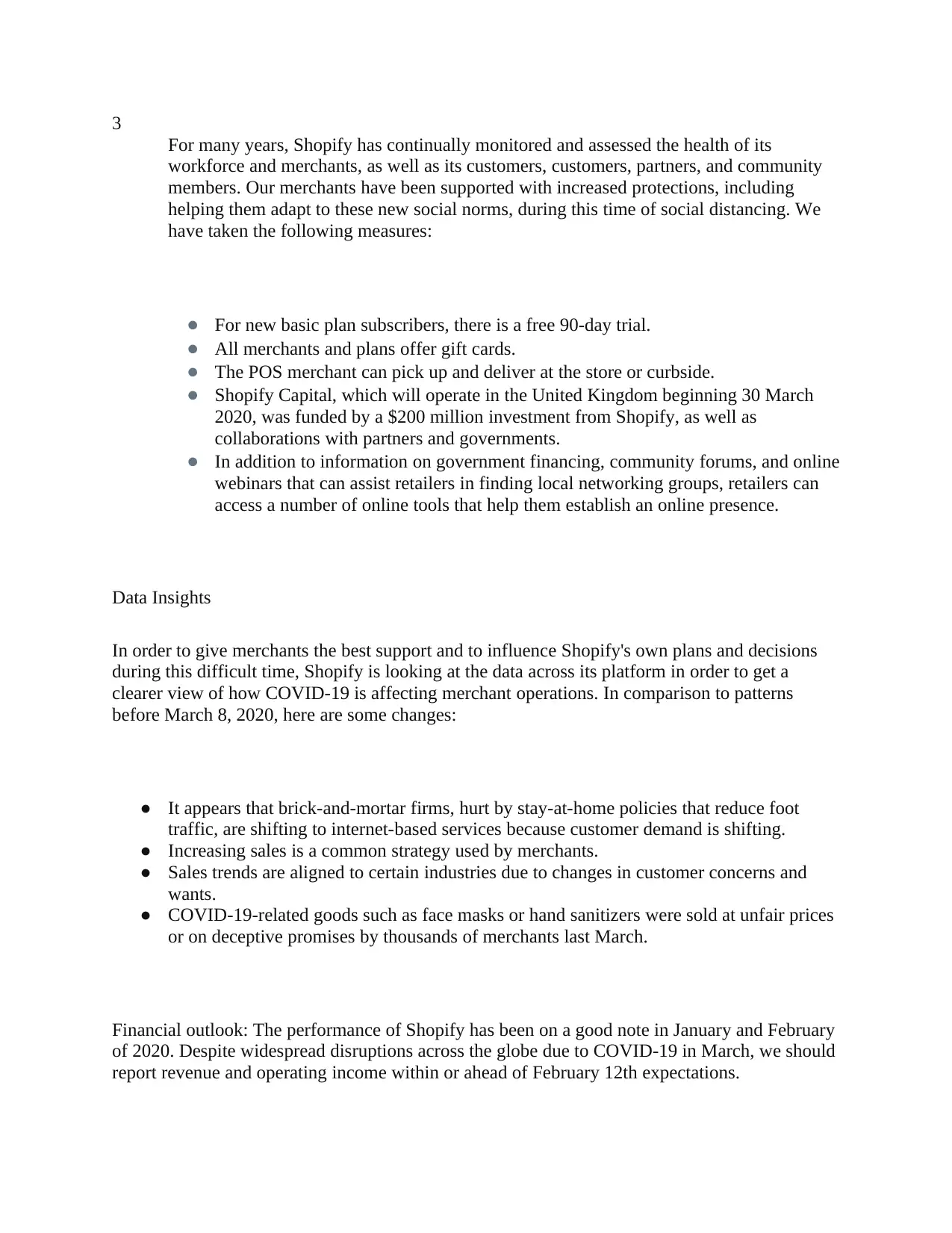
3
For many years, Shopify has continually monitored and assessed the health of its
workforce and merchants, as well as its customers, customers, partners, and community
members. Our merchants have been supported with increased protections, including
helping them adapt to these new social norms, during this time of social distancing. We
have taken the following measures:
● For new basic plan subscribers, there is a free 90-day trial.
● All merchants and plans offer gift cards.
● The POS merchant can pick up and deliver at the store or curbside.
● Shopify Capital, which will operate in the United Kingdom beginning 30 March
2020, was funded by a $200 million investment from Shopify, as well as
collaborations with partners and governments.
● In addition to information on government financing, community forums, and online
webinars that can assist retailers in finding local networking groups, retailers can
access a number of online tools that help them establish an online presence.
Data Insights
In order to give merchants the best support and to influence Shopify's own plans and decisions
during this difficult time, Shopify is looking at the data across its platform in order to get a
clearer view of how COVID-19 is affecting merchant operations. In comparison to patterns
before March 8, 2020, here are some changes:
● It appears that brick-and-mortar firms, hurt by stay-at-home policies that reduce foot
traffic, are shifting to internet-based services because customer demand is shifting.
● Increasing sales is a common strategy used by merchants.
● Sales trends are aligned to certain industries due to changes in customer concerns and
wants.
● COVID-19-related goods such as face masks or hand sanitizers were sold at unfair prices
or on deceptive promises by thousands of merchants last March.
Financial outlook: The performance of Shopify has been on a good note in January and February
of 2020. Despite widespread disruptions across the globe due to COVID-19 in March, we should
report revenue and operating income within or ahead of February 12th expectations.
For many years, Shopify has continually monitored and assessed the health of its
workforce and merchants, as well as its customers, customers, partners, and community
members. Our merchants have been supported with increased protections, including
helping them adapt to these new social norms, during this time of social distancing. We
have taken the following measures:
● For new basic plan subscribers, there is a free 90-day trial.
● All merchants and plans offer gift cards.
● The POS merchant can pick up and deliver at the store or curbside.
● Shopify Capital, which will operate in the United Kingdom beginning 30 March
2020, was funded by a $200 million investment from Shopify, as well as
collaborations with partners and governments.
● In addition to information on government financing, community forums, and online
webinars that can assist retailers in finding local networking groups, retailers can
access a number of online tools that help them establish an online presence.
Data Insights
In order to give merchants the best support and to influence Shopify's own plans and decisions
during this difficult time, Shopify is looking at the data across its platform in order to get a
clearer view of how COVID-19 is affecting merchant operations. In comparison to patterns
before March 8, 2020, here are some changes:
● It appears that brick-and-mortar firms, hurt by stay-at-home policies that reduce foot
traffic, are shifting to internet-based services because customer demand is shifting.
● Increasing sales is a common strategy used by merchants.
● Sales trends are aligned to certain industries due to changes in customer concerns and
wants.
● COVID-19-related goods such as face masks or hand sanitizers were sold at unfair prices
or on deceptive promises by thousands of merchants last March.
Financial outlook: The performance of Shopify has been on a good note in January and February
of 2020. Despite widespread disruptions across the globe due to COVID-19 in March, we should
report revenue and operating income within or ahead of February 12th expectations.
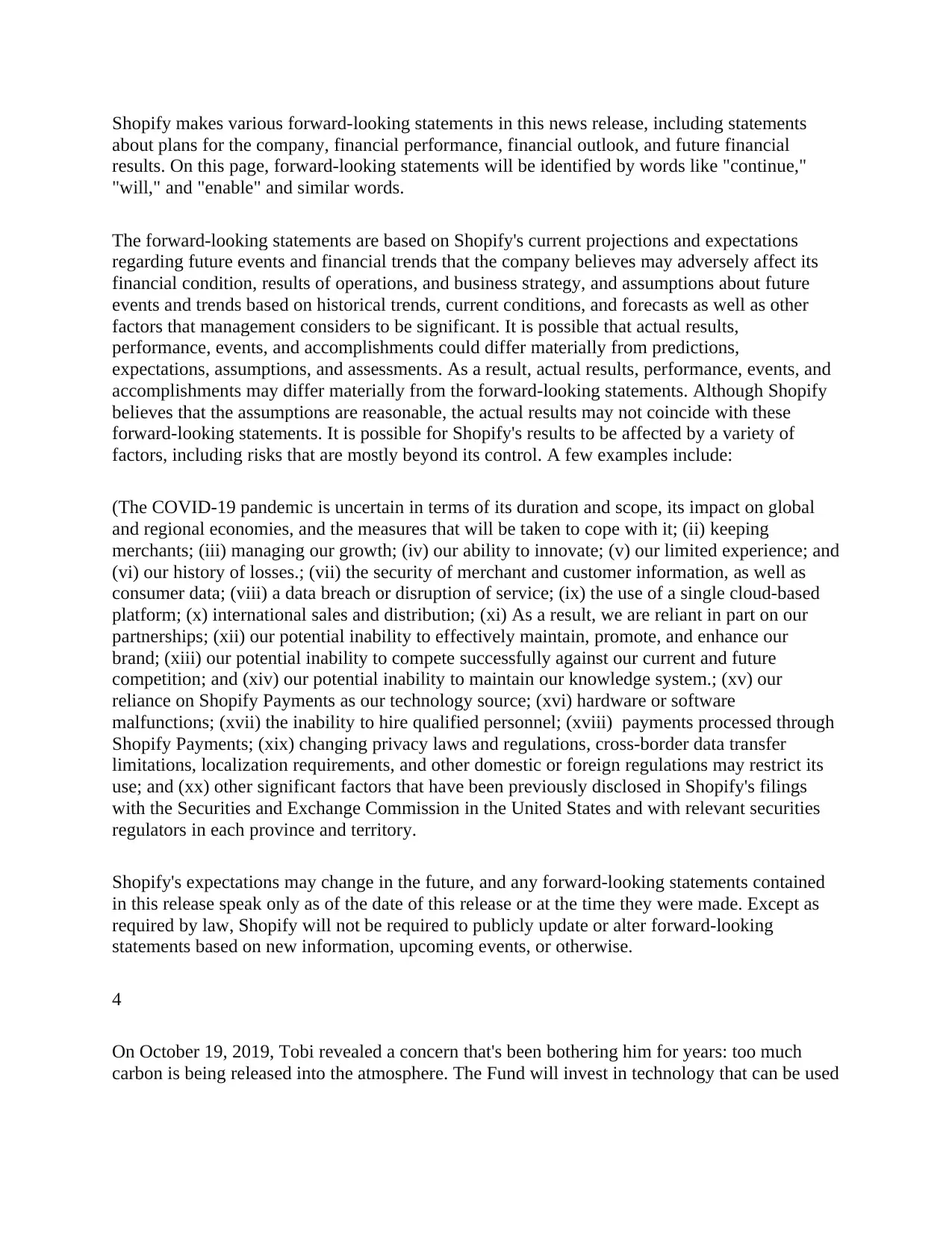
Shopify makes various forward-looking statements in this news release, including statements
about plans for the company, financial performance, financial outlook, and future financial
results. On this page, forward-looking statements will be identified by words like "continue,"
"will," and "enable" and similar words.
The forward-looking statements are based on Shopify's current projections and expectations
regarding future events and financial trends that the company believes may adversely affect its
financial condition, results of operations, and business strategy, and assumptions about future
events and trends based on historical trends, current conditions, and forecasts as well as other
factors that management considers to be significant. It is possible that actual results,
performance, events, and accomplishments could differ materially from predictions,
expectations, assumptions, and assessments. As a result, actual results, performance, events, and
accomplishments may differ materially from the forward-looking statements. Although Shopify
believes that the assumptions are reasonable, the actual results may not coincide with these
forward-looking statements. It is possible for Shopify's results to be affected by a variety of
factors, including risks that are mostly beyond its control. A few examples include:
(The COVID-19 pandemic is uncertain in terms of its duration and scope, its impact on global
and regional economies, and the measures that will be taken to cope with it; (ii) keeping
merchants; (iii) managing our growth; (iv) our ability to innovate; (v) our limited experience; and
(vi) our history of losses.; (vii) the security of merchant and customer information, as well as
consumer data; (viii) a data breach or disruption of service; (ix) the use of a single cloud-based
platform; (x) international sales and distribution; (xi) As a result, we are reliant in part on our
partnerships; (xii) our potential inability to effectively maintain, promote, and enhance our
brand; (xiii) our potential inability to compete successfully against our current and future
competition; and (xiv) our potential inability to maintain our knowledge system.; (xv) our
reliance on Shopify Payments as our technology source; (xvi) hardware or software
malfunctions; (xvii) the inability to hire qualified personnel; (xviii) payments processed through
Shopify Payments; (xix) changing privacy laws and regulations, cross-border data transfer
limitations, localization requirements, and other domestic or foreign regulations may restrict its
use; and (xx) other significant factors that have been previously disclosed in Shopify's filings
with the Securities and Exchange Commission in the United States and with relevant securities
regulators in each province and territory.
Shopify's expectations may change in the future, and any forward-looking statements contained
in this release speak only as of the date of this release or at the time they were made. Except as
required by law, Shopify will not be required to publicly update or alter forward-looking
statements based on new information, upcoming events, or otherwise.
4
On October 19, 2019, Tobi revealed a concern that's been bothering him for years: too much
carbon is being released into the atmosphere. The Fund will invest in technology that can be used
about plans for the company, financial performance, financial outlook, and future financial
results. On this page, forward-looking statements will be identified by words like "continue,"
"will," and "enable" and similar words.
The forward-looking statements are based on Shopify's current projections and expectations
regarding future events and financial trends that the company believes may adversely affect its
financial condition, results of operations, and business strategy, and assumptions about future
events and trends based on historical trends, current conditions, and forecasts as well as other
factors that management considers to be significant. It is possible that actual results,
performance, events, and accomplishments could differ materially from predictions,
expectations, assumptions, and assessments. As a result, actual results, performance, events, and
accomplishments may differ materially from the forward-looking statements. Although Shopify
believes that the assumptions are reasonable, the actual results may not coincide with these
forward-looking statements. It is possible for Shopify's results to be affected by a variety of
factors, including risks that are mostly beyond its control. A few examples include:
(The COVID-19 pandemic is uncertain in terms of its duration and scope, its impact on global
and regional economies, and the measures that will be taken to cope with it; (ii) keeping
merchants; (iii) managing our growth; (iv) our ability to innovate; (v) our limited experience; and
(vi) our history of losses.; (vii) the security of merchant and customer information, as well as
consumer data; (viii) a data breach or disruption of service; (ix) the use of a single cloud-based
platform; (x) international sales and distribution; (xi) As a result, we are reliant in part on our
partnerships; (xii) our potential inability to effectively maintain, promote, and enhance our
brand; (xiii) our potential inability to compete successfully against our current and future
competition; and (xiv) our potential inability to maintain our knowledge system.; (xv) our
reliance on Shopify Payments as our technology source; (xvi) hardware or software
malfunctions; (xvii) the inability to hire qualified personnel; (xviii) payments processed through
Shopify Payments; (xix) changing privacy laws and regulations, cross-border data transfer
limitations, localization requirements, and other domestic or foreign regulations may restrict its
use; and (xx) other significant factors that have been previously disclosed in Shopify's filings
with the Securities and Exchange Commission in the United States and with relevant securities
regulators in each province and territory.
Shopify's expectations may change in the future, and any forward-looking statements contained
in this release speak only as of the date of this release or at the time they were made. Except as
required by law, Shopify will not be required to publicly update or alter forward-looking
statements based on new information, upcoming events, or otherwise.
4
On October 19, 2019, Tobi revealed a concern that's been bothering him for years: too much
carbon is being released into the atmosphere. The Fund will invest in technology that can be used
⊘ This is a preview!⊘
Do you want full access?
Subscribe today to unlock all pages.

Trusted by 1+ million students worldwide
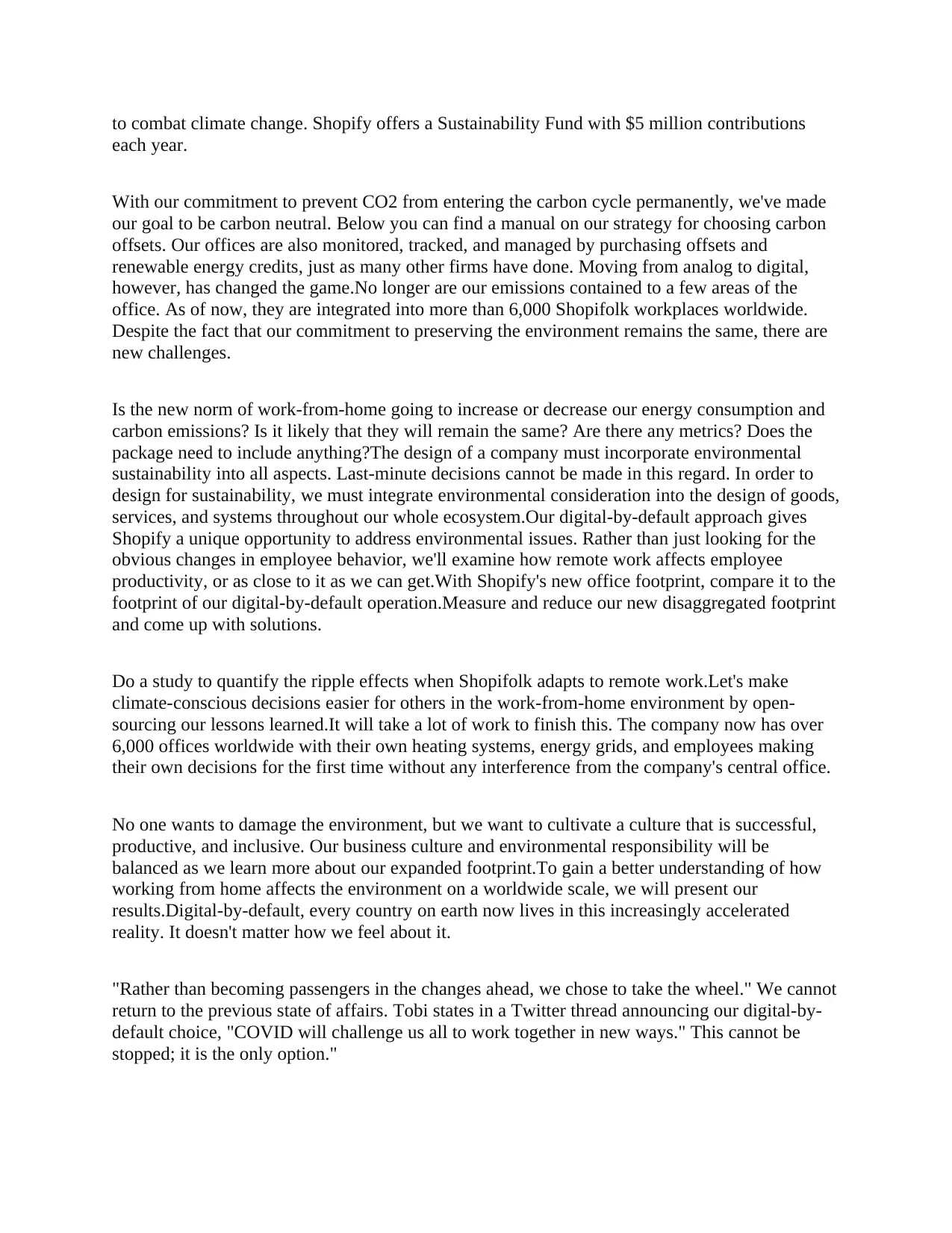
to combat climate change. Shopify offers a Sustainability Fund with $5 million contributions
each year.
With our commitment to prevent CO2 from entering the carbon cycle permanently, we've made
our goal to be carbon neutral. Below you can find a manual on our strategy for choosing carbon
offsets. Our offices are also monitored, tracked, and managed by purchasing offsets and
renewable energy credits, just as many other firms have done. Moving from analog to digital,
however, has changed the game.No longer are our emissions contained to a few areas of the
office. As of now, they are integrated into more than 6,000 Shopifolk workplaces worldwide.
Despite the fact that our commitment to preserving the environment remains the same, there are
new challenges.
Is the new norm of work-from-home going to increase or decrease our energy consumption and
carbon emissions? Is it likely that they will remain the same? Are there any metrics? Does the
package need to include anything?The design of a company must incorporate environmental
sustainability into all aspects. Last-minute decisions cannot be made in this regard. In order to
design for sustainability, we must integrate environmental consideration into the design of goods,
services, and systems throughout our whole ecosystem.Our digital-by-default approach gives
Shopify a unique opportunity to address environmental issues. Rather than just looking for the
obvious changes in employee behavior, we'll examine how remote work affects employee
productivity, or as close to it as we can get.With Shopify's new office footprint, compare it to the
footprint of our digital-by-default operation.Measure and reduce our new disaggregated footprint
and come up with solutions.
Do a study to quantify the ripple effects when Shopifolk adapts to remote work.Let's make
climate-conscious decisions easier for others in the work-from-home environment by open-
sourcing our lessons learned.It will take a lot of work to finish this. The company now has over
6,000 offices worldwide with their own heating systems, energy grids, and employees making
their own decisions for the first time without any interference from the company's central office.
No one wants to damage the environment, but we want to cultivate a culture that is successful,
productive, and inclusive. Our business culture and environmental responsibility will be
balanced as we learn more about our expanded footprint.To gain a better understanding of how
working from home affects the environment on a worldwide scale, we will present our
results.Digital-by-default, every country on earth now lives in this increasingly accelerated
reality. It doesn't matter how we feel about it.
"Rather than becoming passengers in the changes ahead, we chose to take the wheel." We cannot
return to the previous state of affairs. Tobi states in a Twitter thread announcing our digital-by-
default choice, "COVID will challenge us all to work together in new ways." This cannot be
stopped; it is the only option."
each year.
With our commitment to prevent CO2 from entering the carbon cycle permanently, we've made
our goal to be carbon neutral. Below you can find a manual on our strategy for choosing carbon
offsets. Our offices are also monitored, tracked, and managed by purchasing offsets and
renewable energy credits, just as many other firms have done. Moving from analog to digital,
however, has changed the game.No longer are our emissions contained to a few areas of the
office. As of now, they are integrated into more than 6,000 Shopifolk workplaces worldwide.
Despite the fact that our commitment to preserving the environment remains the same, there are
new challenges.
Is the new norm of work-from-home going to increase or decrease our energy consumption and
carbon emissions? Is it likely that they will remain the same? Are there any metrics? Does the
package need to include anything?The design of a company must incorporate environmental
sustainability into all aspects. Last-minute decisions cannot be made in this regard. In order to
design for sustainability, we must integrate environmental consideration into the design of goods,
services, and systems throughout our whole ecosystem.Our digital-by-default approach gives
Shopify a unique opportunity to address environmental issues. Rather than just looking for the
obvious changes in employee behavior, we'll examine how remote work affects employee
productivity, or as close to it as we can get.With Shopify's new office footprint, compare it to the
footprint of our digital-by-default operation.Measure and reduce our new disaggregated footprint
and come up with solutions.
Do a study to quantify the ripple effects when Shopifolk adapts to remote work.Let's make
climate-conscious decisions easier for others in the work-from-home environment by open-
sourcing our lessons learned.It will take a lot of work to finish this. The company now has over
6,000 offices worldwide with their own heating systems, energy grids, and employees making
their own decisions for the first time without any interference from the company's central office.
No one wants to damage the environment, but we want to cultivate a culture that is successful,
productive, and inclusive. Our business culture and environmental responsibility will be
balanced as we learn more about our expanded footprint.To gain a better understanding of how
working from home affects the environment on a worldwide scale, we will present our
results.Digital-by-default, every country on earth now lives in this increasingly accelerated
reality. It doesn't matter how we feel about it.
"Rather than becoming passengers in the changes ahead, we chose to take the wheel." We cannot
return to the previous state of affairs. Tobi states in a Twitter thread announcing our digital-by-
default choice, "COVID will challenge us all to work together in new ways." This cannot be
stopped; it is the only option."
Paraphrase This Document
Need a fresh take? Get an instant paraphrase of this document with our AI Paraphraser
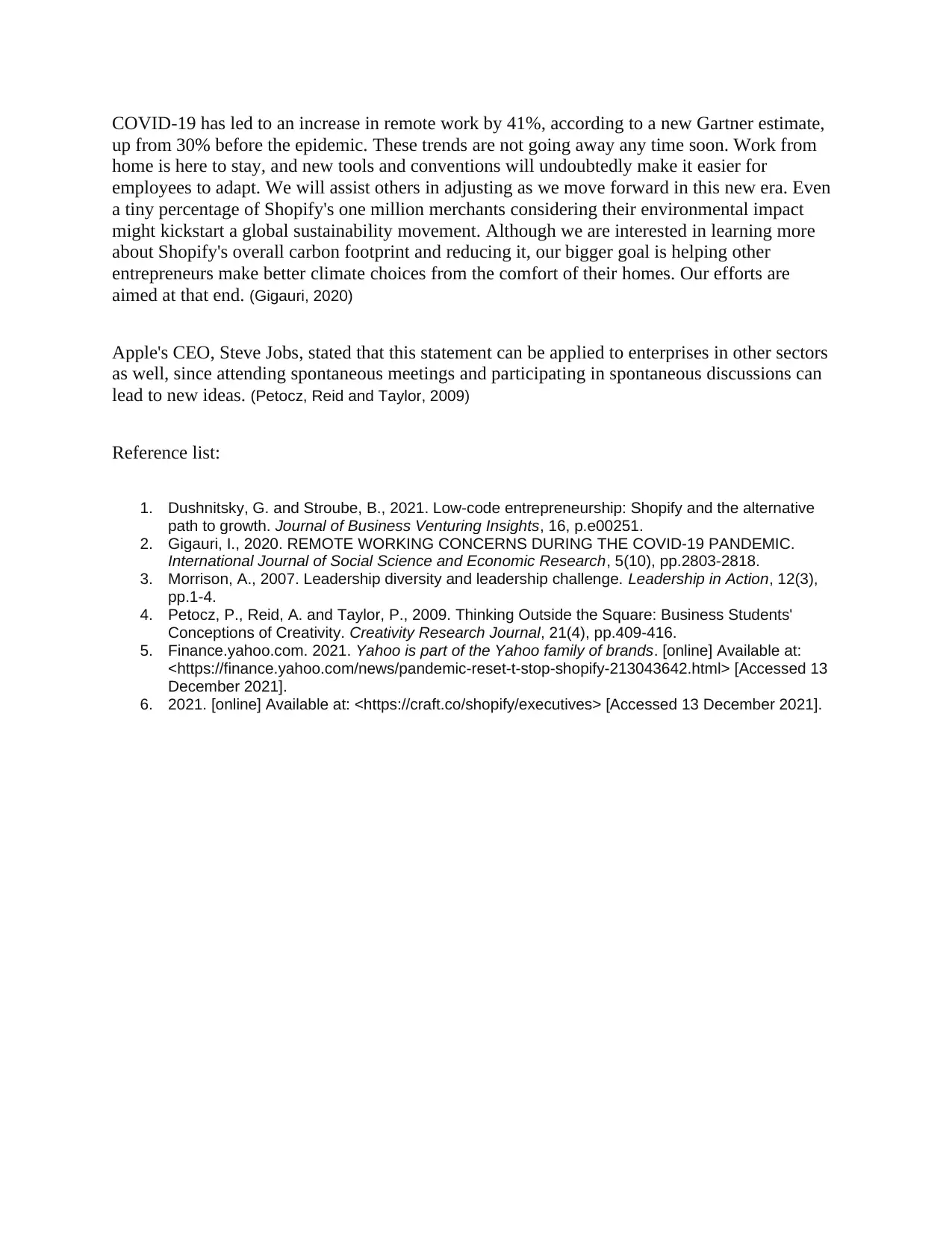
COVID-19 has led to an increase in remote work by 41%, according to a new Gartner estimate,
up from 30% before the epidemic. These trends are not going away any time soon. Work from
home is here to stay, and new tools and conventions will undoubtedly make it easier for
employees to adapt. We will assist others in adjusting as we move forward in this new era. Even
a tiny percentage of Shopify's one million merchants considering their environmental impact
might kickstart a global sustainability movement. Although we are interested in learning more
about Shopify's overall carbon footprint and reducing it, our bigger goal is helping other
entrepreneurs make better climate choices from the comfort of their homes. Our efforts are
aimed at that end. (Gigauri, 2020)
Apple's CEO, Steve Jobs, stated that this statement can be applied to enterprises in other sectors
as well, since attending spontaneous meetings and participating in spontaneous discussions can
lead to new ideas. (Petocz, Reid and Taylor, 2009)
Reference list:
1. Dushnitsky, G. and Stroube, B., 2021. Low-code entrepreneurship: Shopify and the alternative
path to growth. Journal of Business Venturing Insights, 16, p.e00251.
2. Gigauri, I., 2020. REMOTE WORKING CONCERNS DURING THE COVID-19 PANDEMIC.
International Journal of Social Science and Economic Research, 5(10), pp.2803-2818.
3. Morrison, A., 2007. Leadership diversity and leadership challenge. Leadership in Action, 12(3),
pp.1-4.
4. Petocz, P., Reid, A. and Taylor, P., 2009. Thinking Outside the Square: Business Students'
Conceptions of Creativity. Creativity Research Journal, 21(4), pp.409-416.
5. Finance.yahoo.com. 2021. Yahoo is part of the Yahoo family of brands. [online] Available at:
<https://finance.yahoo.com/news/pandemic-reset-t-stop-shopify-213043642.html> [Accessed 13
December 2021].
6. 2021. [online] Available at: <https://craft.co/shopify/executives> [Accessed 13 December 2021].
up from 30% before the epidemic. These trends are not going away any time soon. Work from
home is here to stay, and new tools and conventions will undoubtedly make it easier for
employees to adapt. We will assist others in adjusting as we move forward in this new era. Even
a tiny percentage of Shopify's one million merchants considering their environmental impact
might kickstart a global sustainability movement. Although we are interested in learning more
about Shopify's overall carbon footprint and reducing it, our bigger goal is helping other
entrepreneurs make better climate choices from the comfort of their homes. Our efforts are
aimed at that end. (Gigauri, 2020)
Apple's CEO, Steve Jobs, stated that this statement can be applied to enterprises in other sectors
as well, since attending spontaneous meetings and participating in spontaneous discussions can
lead to new ideas. (Petocz, Reid and Taylor, 2009)
Reference list:
1. Dushnitsky, G. and Stroube, B., 2021. Low-code entrepreneurship: Shopify and the alternative
path to growth. Journal of Business Venturing Insights, 16, p.e00251.
2. Gigauri, I., 2020. REMOTE WORKING CONCERNS DURING THE COVID-19 PANDEMIC.
International Journal of Social Science and Economic Research, 5(10), pp.2803-2818.
3. Morrison, A., 2007. Leadership diversity and leadership challenge. Leadership in Action, 12(3),
pp.1-4.
4. Petocz, P., Reid, A. and Taylor, P., 2009. Thinking Outside the Square: Business Students'
Conceptions of Creativity. Creativity Research Journal, 21(4), pp.409-416.
5. Finance.yahoo.com. 2021. Yahoo is part of the Yahoo family of brands. [online] Available at:
<https://finance.yahoo.com/news/pandemic-reset-t-stop-shopify-213043642.html> [Accessed 13
December 2021].
6. 2021. [online] Available at: <https://craft.co/shopify/executives> [Accessed 13 December 2021].
1 out of 8
Related Documents
Your All-in-One AI-Powered Toolkit for Academic Success.
+13062052269
info@desklib.com
Available 24*7 on WhatsApp / Email
![[object Object]](/_next/static/media/star-bottom.7253800d.svg)
Unlock your academic potential
Copyright © 2020–2026 A2Z Services. All Rights Reserved. Developed and managed by ZUCOL.



